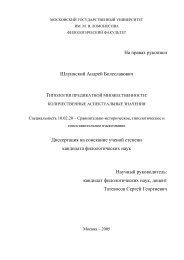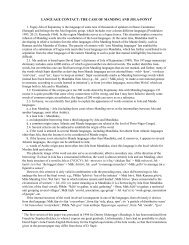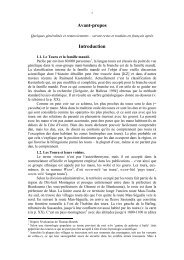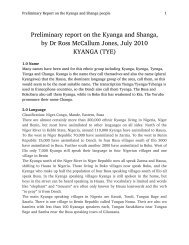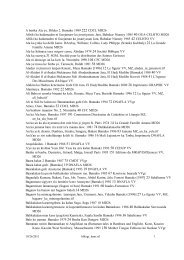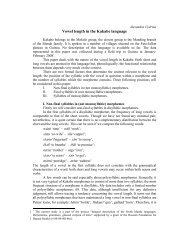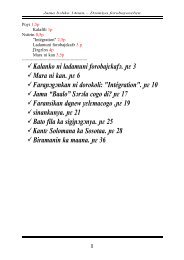like *v > b seems rather unusual, while *b > v looks much more natural. Letus examine the sets of correspondences.It is easy to notice thata) all 7 stems are of the types CV, CVV or CVŋ; in other words, there isno single example of the type CVlV;b) all these stems have a labial vowel following the initial consonant.In the meantime, there is not a single set in the Series 6 which wouldfulfill these conditions. Therefore, b- and v- in Mano and Beng, and tosome extent in Wan and Mwan, are in complimentary distribution. Thereis no reason to reconstruct for the Series 9 an initial consonant other than*b-.In fact, in Mwan, Wan and Beng the conditions of the diachronictransformation *b- > v- must be more complex than those formulated above,so that we find some forms having b-: Mwan 'grave-2', 'send-2'; Wan'send-2', Beng 'ten-2'. The initial b- in Mwan b-g 'wake up' can beexplained by the change of the subsequent vowel *u > i, which preventedthe initial consonant from the transformation.Series 9:S<strong>Mande</strong> Dan Tura Mano Guro Yaure Gban Mwan Wan Beng*b b b v v f b, v b, v b, v*bŋ grave-2 > Dan (gw) b, Dan (kl) b, Tura # bú n grave; mound,Guro #, GR, VV v n grave; mound, Yaure HP fṹ n mound, Gban ST ò,Mwan PM bū, Wan # va (< *v ?) n mound;, Beng # v n mound*bùù harmattan > Dan (bl) bûû, Dan (gw) bȕȕ, Tura # bȕȕ, Guro # fūù(?), Gban ST fȕfȕ (?), Mwan # v*b rot-2 > Dan (bl) bú, Dan (gw) bű vi, Tura # bűű vi, Mano ZE vúúadj, vi rot, Guro # v, hab. v, Gban ST l (?) vi rot, spoil, Mwan b, BengPA v vi rot; be ugly*b send-2 > Dan (bl, gw) b vi pass; cross (river, road); overcome; vt send;sow (rice); produce (sound); fell (tree); add, mix (with – p); till, cultivate, Dan(kl) b vt cultivate, Tura # b vt send; sow (rice); produce (sound), Mano ZEv vt send; fell (tree), Guro #, BN v, hab. va vt rise; enter; fell (tree); send;sow; mount; speak (language); say (proverb); put, throw, Yaure HB f vt sow,Mwan # b vt put inside, Wan # b vi pass; happen; vt make pass*bū ten-2 > Tura # bùù, Mano NE v, Guro GR vū, Gban ST ȕ,Mwan # vū, Beng GL, PA bū
*bùò wake up-2 > Dan (bl) b vi, Mano ZE vùò, Guro # vùò vi wakeup; vt wake smb. up, Yaure HB fù, impf. fȕ-a vi wake up; vt wake smb. up,Gban ST òa, Wan # ba-ga, Mwan bwè.To this series can also be attributed two other sets where Mano forms(Mano is the only language where the transformation *b- > v- under theconditions in question seems to be regular) are absent:*b carry > Dan (bl) b vt carry; support, Dan (gw) b vt accomodate(guest), Tura # bṹ vt suport (physically, e. g. an old person when walking),Gban ST , Beng # b vt carry; bring up, educate*b end-2 > Dan (bl, gw) bō vi stop; finish, terminate (sth. – k); deliveroneself of (excrement); get better; vt cure, Tura # bó vi finish, terminate (sth. –ɓ, --gerund), Guro # v, hab. vō vi remain; vt leave, Yaure HB f vi remain,Gban ST ò v finish, Wan # bò vi remain; finish; vt leave, Mwan bō leave.It is highly probable that the set 'flower' also belongs to this series:*b flower > Dan (bl) b, Dan (gw) b, Dan (kl) b rn flower; viblossom, Tura # b, Mano ZE b, Guro # vū n flower; eyelash; ear (of corn,etc.); animal's tail, Yaure MB fi, Mwan b, Beng # vṹb- in the Mano form can be explained by the loss of -u- in the positionafter the consonant, which prevented the latter from the change *b- > v-. InBeng the vowel was retained and the consonantal change took place.There is one set which contradicts the established rules: we have v- inWan, although it is not followed by a labial vowel, and the foot structureof the proto-stem is CVlV. In the meantime, there is no change *b- > v- inBeng:*bùlŋ (?) porcupine-3 Dan (bl) bl, bl, bl, Dan (gw) bl nporcupine; (bl) African brush-tailed porcupine, Mano MB vulu, Guro # vùlú,Yaure MB furu, Gban ST lű, Wan # vl, Mwan vl rat (?), Beng bl n bigporcupineThis probably means that the rule of change should be modified inWan, or that the Wan form has undergone some intermediate stages(*bùlŋ > *vùlŋ > vl).Finally, the same pattern partially agrees with yet another set:*b plural marker-2 > Dan b fossilized plural marker in several words,Tura # bȍ, Mano VV v, Mwan # mū plural marker, mú they, Wan # muThe nasalization in Mwan and Wan which also led to the irregularchange *b- > m- should be attributed to the grammatical character of thelexeme.
- Page 2: necessary some serious corrections
- Page 7 and 8: 2. Phonological systems of the Sout
- Page 9 and 10: c) The phonological status of palat
- Page 11 and 12: 2.5. Yaure [Lautenschlager 1992].Co
- Page 13 and 14: Note: The phonological status of ll
- Page 15 and 16: question is: should we postulate tw
- Page 17 and 18: Series 2:SMande Dan Tura Mano Guro
- Page 19 and 20: 3.1.4. Series 4 and 5 differ only b
- Page 21 and 22: 3.2. Voiced and implosive labials3.
- Page 23 and 24: esemble (smb. - m); help (smb. - v)
- Page 25: *magólóŋ mango > Dan (bl) malo,
- Page 29 and 30: ? *ɓl respect-2 > Dan (bl) ɓl, Da
- Page 31 and 32: Type I: *m. This series rises no qu
- Page 33 and 34: 2) for the same stem, the Mano form
- Page 35 and 36: *t red-1 > Dan (bh, yi) t, Dan (kl)
- Page 37 and 38: ? *tó chest-2 > Dan (gw, kl) # tȍ
- Page 39: VIII. Tagung der Vereinigung der Se
- Page 43 and 44: *ɗó leave (go away)-1 > Dan (bl,
- Page 45 and 46: *ɗŋ place-3 > Dan (bl) ɗ, Dan (g
- Page 47 and 48: uncle's wife, Mano ZE lèē, Mwan #
- Page 49 and 50: *s oilpalm grain-2 > Dan (bl) s n o
- Page 51 and 52: Series 20:SMande Dan Tura Mano Guro
- Page 53 and 54: *zèē here-2 > Dan (bl) z, Dan (gw
- Page 55 and 56: Series 24:SMande Dan Tura Mano Guro
- Page 57 and 58: *ka house-1 > Dan (bl, gw, kl) k, T
- Page 59 and 60: In the 'skin' set, the Kla-Dan form
- Page 61 and 62: *gŋ hill-2 > Dan (bl) gōō, Tura
- Page 63 and 64: (For further examples cf. series 29
- Page 65 and 66: ? *ƙùl round-2 > Dan (bn) gl, Dan
- Page 67 and 68: *gb baboon (Papio cynocephalus) > D
- Page 69 and 70: SMande Dan Tura Mano Guro Yaure Gba
- Page 71 and 72: of the types *kUlE, *kUlA, *kUE, *k
- Page 73 and 74: *y breast-3 > Dan (bl, gw, kl) y, T
- Page 75 and 76: SMande Dan Tura Mano Guro Yaure Gba
- Page 77 and 78:
process may be reconstructed: *yl >
- Page 79 and 80:
*wūō cry-1 > Guro ST wū, Guro BN
- Page 81 and 82:
*wōlō pick up > Dan (bl) lōō vt
- Page 83 and 84:
4. The reconstructed proto-SM syste
- Page 85 and 86:
Abbreviationsadj - adjectiveadv - a
- Page 87 and 88:
Flik 1977Flik, Eva. Tone glides and
- Page 89 and 90:
Prost 1950/1968Prost 1953Prost Ms.R



